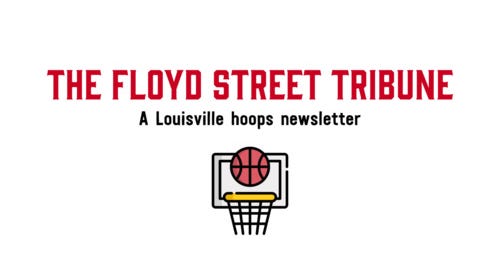TFST Extra: The IARP ends Louisville's FBI saga
Inside: With 24 hours or so to digest the IARP decision, The Floyd Street Tribune reflects on the past five years for Louisville men's basketball.
Thanks for reading The Floyd Street Tribune! Here is a short reflection on this week’s big IARP news to carry you into the weekend.
There’s an episode of Seinfeld when Elaine dates a “Bad Breaker-Upper.” He has ex-girlfriends attack him in various ways in front of her. He tells horrible stories of even more confrontations from his past. At first, Elaine finds it attractive that he brings out so much passion from his former lovers. But eventually they split up.
When Elaine calls it off, the dude says she has a big head. She laughs and laughs and responds, “That’s it?! That’s the best you got?!” But over the rest of the episode, the big head remark keeps, uh, rearing its head, and ultimately eats at Elaine’s very core.
I say all that to say this: The IARP’s decision came out Thursday, and it was close to what this newsletter has been discussing for some time — no postseason ban, a small fine and some recruiting restrictions. Louisville doesn’t even have to fork over any scholarships, which actually stinks for the Cards, who were withholding three this season in anticipation of needing to sacrifice them. Boy, could they use those scholarships on this team. And so, just like Elaine, we all laughed and laughed and just thought, “That’s it?! That’s all you got?!”
Yet the more I reflect on the final milestone of this ridiculous saga that involved the FB-freaking-I investigating college basketball, the more the real punishment sticks out to me. It was right there all along, lingering. The punishment was simply time — five years of uncertainty, of negativity, of suspicion, of doubt all eating at Louisville. And that penalty put Louisville’s men’s basketball program in a deep hole, eating away at Cards hoops year after year, recruiting cycle after recruiting cycle.
“As positive of a day as this is, we can’t forget the last five years and what it has done to this program,” Louisville athletics director Josh Heird said Thursday. “The millions of dollars that this program has spent, the millions of dollars this program has lost, the opportunity for the student-athletes to compete at the highest level, which is the expectation when they come to the University of Louisville — it has been a big impact.”
There is, of course, a silver lining to time being the punishment that it was, and that is, clearly, that it’s over. Louisville now gets the chance to operate without a shadow. It is time served. That is great for Kenny Payne and his recruiting efforts going forward. That is great for Louisville’s bank account. From a procedural standpoint, everything involving Louisville, the NCAA enforcement staff and the IARP is over. That’s great for all of us, too. I can throw away all the stupid little IARP factoids I’d stowed somewhere in my brain.
All that freedom will make it a lot easier for U of L to rebuild. But that’s a key word: This is a rebuild. Louisville has a reputation to repair, especially on the recruiting trail, where the Cards don’t have recent success to point to and, until yesterday, didn’t even know if they would — for sure — be postseason eligible in the near future. Louisville also has work to do with its own community, something that became clear during the coaching search, when doubts about money, support and even interest lingered in some corners. The five years of uncertainty — five years of questions about how clean the program is — dogged U of L’s booster base and dirtied its reputation. Some of that is quantifiable, much of it isn’t.
Everything fed everything else. The FBI announcement put the university in a tough spot with Rick Pitino, ultimately resulting in his dismissal. The off-court drama regularly hurt team morale. The lack of success led to fewer fans at games. Relationships fractured. A new coach came in without fully realizing just how much murky water there was, then he did himself no favors in navigating it all, leading to his own departure and even more drama.
Now comes the heavy lifting. Heird and Payne both seem crystal clear on that need for healing, evidenced by their consistent efforts the past few months to get in front of as many people as possible to talk about repairing relationships, building a strong foundation, enhancing trust through action, etc. Those are difficult but necessary conversations, prompted in no small part by five years of doubt and uncertainty. As Payne said Thursday night after his team’s narrow exhibition win over Chaminade, he can now move on from asking parents and recruits to trust his word that everything will be OK … to actually having hard evidence that Louisville is in the clear.
Time served is time lost. That’s a painful truth, especially in the rapid-moving world of college sports and, in particular, college basketball. Decay can build. Just ask my alma mater, which went from a regular contender for Big East titles to an ACC afterthought in just seven years.
The good news, however, is that Louisville isn’t starting from scratch, with the resources and capable leaders in place to build back, a community largely invested in helping and the history of success and pride to draw from. And it has a player directly connected to very core of the program’s tradition working on returning the team to its powerful perch in college basketball. Payne may not get the Cards there. Or he may just need a while. Either way, the weight is off his shoulders, and Louisville men’s basketball is fighting with two hands again.





Great read, Jeff!